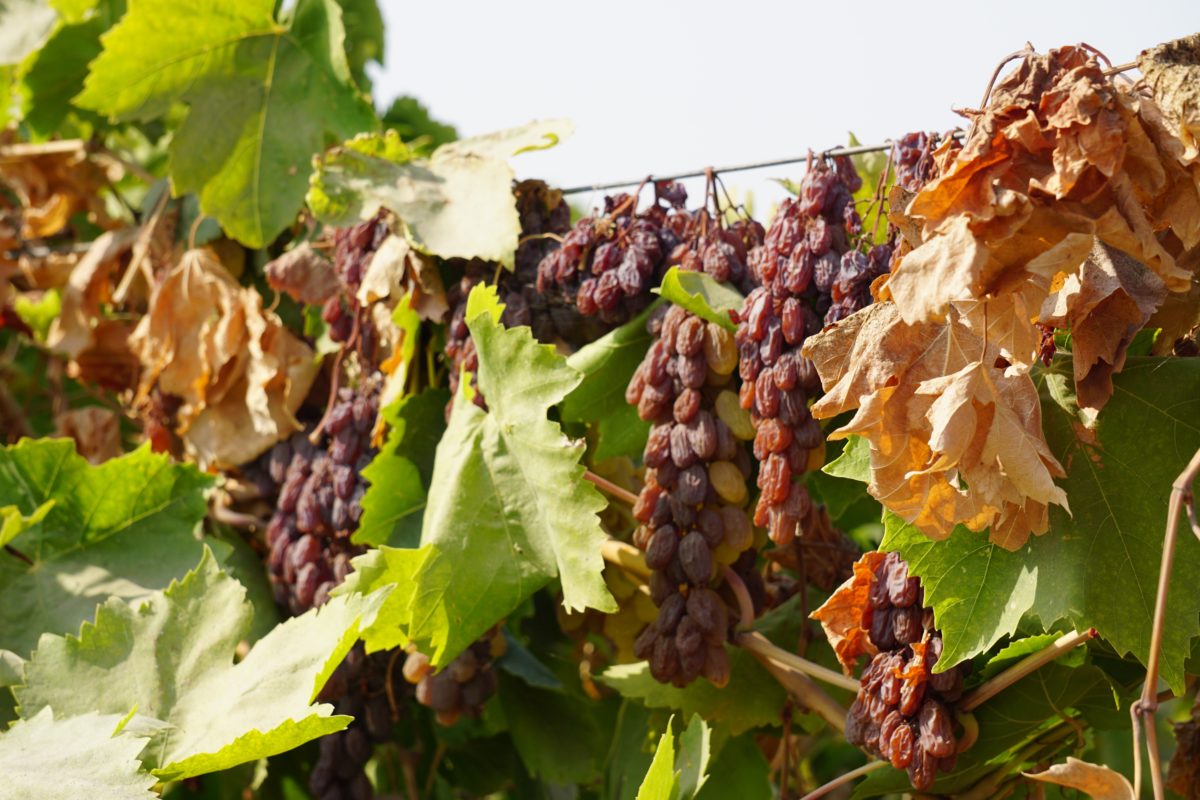
Smoke and cool weather has made it hard for raisins to dry enough to meet standards set by the United States Department of Agriculture. Photo by Edward Smith
Written by Edward Smith
Editor’s Note: This story comes from the Sept. 25 edition of The Business Journal.
Just as smoke from wildfires poses a threat to people, so too does it pose a two-fold threat to the grape industry.
Billowing smoke from burning trees and brush blocks precious UV rays that should normally be turning grapes into raisins.
While people in the Central Valley have found relief in cooler weather thanks to smoky skies, farmers hope for a break of their own — that the sun will come out to shine long enough to dry the grapes in hopes of calling them raisins.
In order to qualify for crop insurance, growers had to have their grapes picked and drying on paper trays on the ground this week, said Easton-area grape grower Dwayne Cardoza, vice president of the Fresno-based Raisin Bargaining Association. The season starts about the third week of August and the drying process normally takes two to three weeks.
Cardoza’s grapes have been on the ground for 21 days. They still haven’t fully dried.
“This is almost like a rain year without the rain,” Cardoza said.
The smoke has blocked out a lot of sunlight and there just isn’t enough heat to do the job. Combine those factors with higher than normal humidity and it’s left growers wondering about the entire crop.
“In some cases, the fruit is picking up moisture because of the humidity in the morning,” he said.
Cardoza’s harvest is about 60% complete. Other growers were still finishing picking this week.
If the grapes take too long to dry, rot can set in. To be called raisins, the United States Department of Agriculture inspects the dried grapes for 16 standards, including moisture, mold, infestation, maturity and a host of others.
Growers have the option of dehydrating mechanically, as is done with golden raisins, but the process is costly. Cardoza said the contracts with dehydrators have all been filled.
Prices are also in dispute. While farmers need to recoup their investment, raisins need to be priced at a rate where they can both compete against imports domestically and as exports internationally.
Grape yields this season have been off around 30%-40%, according to Kalem Barserian, CEO of the Raisin Bargaining Association.
Normally, an acre might bring in nine tons, but this year an acre averaged five to six tons.
“For whatever reason, the vines took a rest,” said Barserian.
Discussions are currently underway with packinghouses on the contract price. Packers and growers are going back and forth negotiating prices from $1,500 to $1,900 per ton. Prices are usually decided in October.
Raisins have also had to compete in a growing world market. Turkey, California’s biggest competitor, has 65,000 growers alone, whereas the Golden State has only 1,800, said Barserian.
Over the past 20 years, acreage has been halved, with the land transforming into almonds, pistachios or real estate.
Growers are waiting to see if crops will be covered by insurance should they not dry sufficiently. In the meantime, however, they still have to show good faith in their attempt to make and deliver the raisins to file an insurance claim, said Cardoza.
This can make planning for next year difficult, he added.
Those using grapes for wine are also waiting to see what effect smoke will bring.
For red wines that ferment with the skin and pulp of the grape, they may be doing so with smoke and ash from the fire.
“A lot of times, the smoke won’t appear in the wine until much later, after it has had time to sit in the barrel,” said Shayne Vetter, winemaker for Toca Madera Winery.
Some wineries picked before the fires got really bad, but others waited.
“We were one of the later vineyards as far as picking grapes,” said Vetter. “Usually that’s a great thing and makes the wine better, but that could potentially be the thing that causes the most problems this year.”
White wines aren’t too susceptible to what winemakers call “smoke taint,” as the juice ferments after being filtered from the grape crush.
The smoke may not be enough to impact the wine.
Vetter fears a wine shortage may come to California after record consumption and smoke impacted vineyards statewide. For a long time, a glut in production had made wine cheap. In the short term, higher prices may be better for wineries, but it will impact the ability to compete globally.
With the regularity of wildfires, Vetter wonders if smoke will become a regular feature in California wines.
“It sounds crazy, but it’s not that far off, there’s plenty of regions in the world where certain circumstances have made the wines taste a certain way,” said Vetter.







